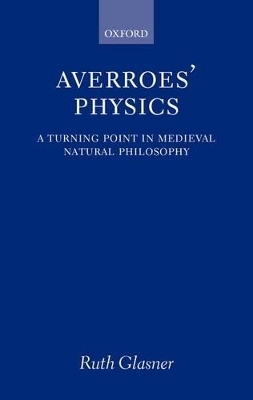
Averroes' Physics
A Turning Point in Medieval Natural Philosophy
Seiten
2009
Oxford University Press (Verlag)
978-0-19-956773-7 (ISBN)
Oxford University Press (Verlag)
978-0-19-956773-7 (ISBN)
Ruth Glasner presents an illuminating reappraisal of the role played by the 12th-century Andalusian Muslim polymath Averroes in the development of medieval science and philosophy. She reveals how Averroes pioneered a bold new atomistic physical theory, and shows that he deserves at last to be recognized as an original and sophisticated philosopher.
Ruth Glasner presents an illuminating reappraisal of Averroes' physics. Glasner is the first scholar to base her interpretation on the full range of Averroes' writings, including texts that are extant only in Hebrew manuscripts and have not been hitherto studied. She reveals that Averroes changed his interpretation of the basic notions of physics - the structure of corporeal reality and the definition of motion - more than once. After many hesitations he offers a bold new interpretation of physics which Glasner calls 'Aristotelian atomism'. Ideas that are usually ascribed to scholastic scholars, and others that were traced back to Averroes but only in a very general form, are shown not only to have originated with him, but to have been fully developed by him into a comprehensive and systematic physical system. Unlike earlier Greek or Muslim atomistic systems, Averroes' Aristotelian atomism endeavours to be fully scientific, by Aristotelian standards, and still to provide a basis for an indeterministic natural philosophy. Commonly known as 'the commentator' and usually considered to be a faithful follower of Aristotle, Averroes is revealed in his commentaries on the Physics to be an original and sophisticated philosopher.
Ruth Glasner presents an illuminating reappraisal of Averroes' physics. Glasner is the first scholar to base her interpretation on the full range of Averroes' writings, including texts that are extant only in Hebrew manuscripts and have not been hitherto studied. She reveals that Averroes changed his interpretation of the basic notions of physics - the structure of corporeal reality and the definition of motion - more than once. After many hesitations he offers a bold new interpretation of physics which Glasner calls 'Aristotelian atomism'. Ideas that are usually ascribed to scholastic scholars, and others that were traced back to Averroes but only in a very general form, are shown not only to have originated with him, but to have been fully developed by him into a comprehensive and systematic physical system. Unlike earlier Greek or Muslim atomistic systems, Averroes' Aristotelian atomism endeavours to be fully scientific, by Aristotelian standards, and still to provide a basis for an indeterministic natural philosophy. Commonly known as 'the commentator' and usually considered to be a faithful follower of Aristotle, Averroes is revealed in his commentaries on the Physics to be an original and sophisticated philosopher.
Ruth Glasner studied mathematics, physics and philosophy at the Hebrew University. She is currently a professor at the program for the history and philosophy of science at the Hebrew University
PART 1: THE COMPLEXITY OF AVERROES' WRITING ; PART 2: AVERROES' NEW PHYSICS
| Erscheint lt. Verlag | 18.6.2009 |
|---|---|
| Verlagsort | Oxford |
| Sprache | englisch |
| Maße | 145 x 222 mm |
| Gewicht | 443 g |
| Themenwelt | Geisteswissenschaften ► Philosophie ► Östliche Philosophie |
| Geisteswissenschaften ► Philosophie ► Philosophie Altertum / Antike | |
| Geisteswissenschaften ► Philosophie ► Philosophie des Mittelalters | |
| Naturwissenschaften ► Physik / Astronomie | |
| ISBN-10 | 0-19-956773-5 / 0199567735 |
| ISBN-13 | 978-0-19-956773-7 / 9780199567737 |
| Zustand | Neuware |
| Haben Sie eine Frage zum Produkt? |
Mehr entdecken
aus dem Bereich
aus dem Bereich


